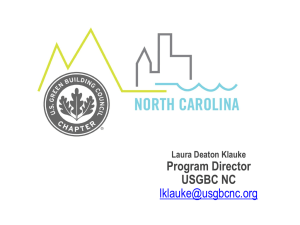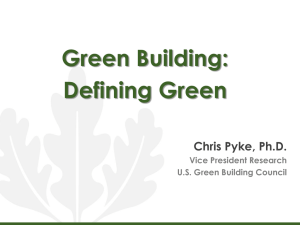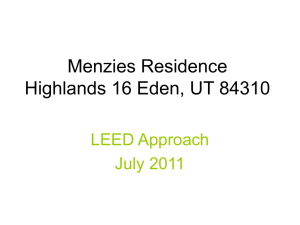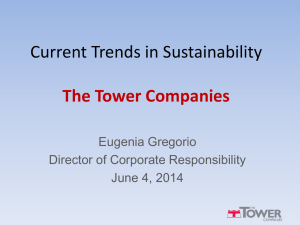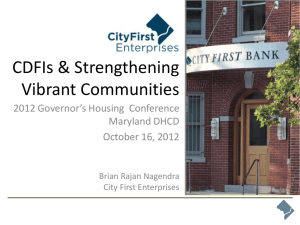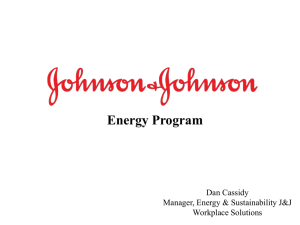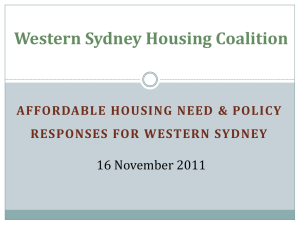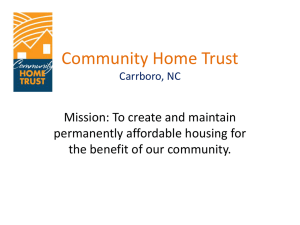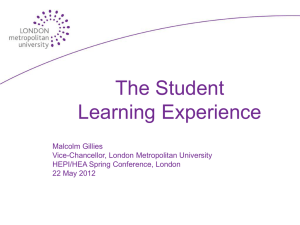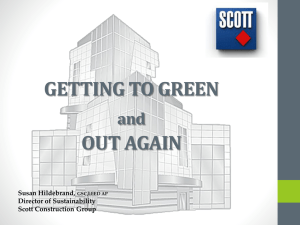Presentation 1 - National Healthy Homes Conference
advertisement
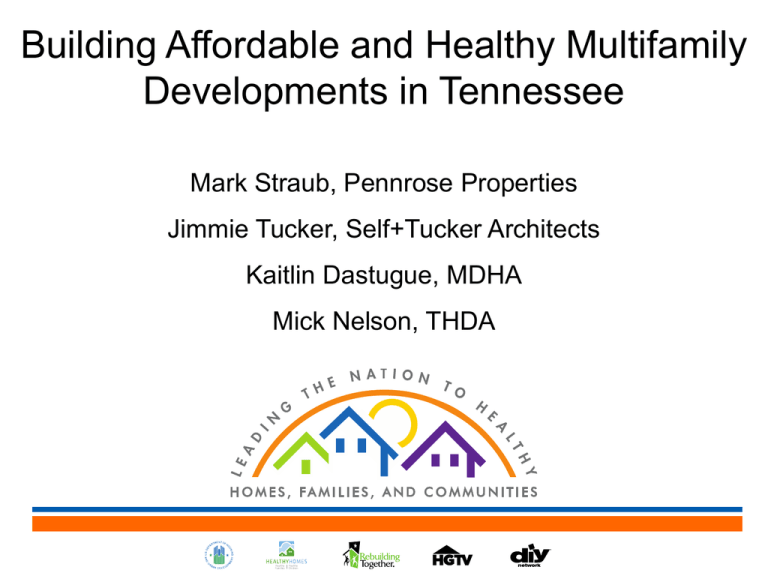
Building Affordable and Healthy Multifamily Developments in Tennessee Mark Straub, Pennrose Properties Jimmie Tucker, Self+Tucker Architects Kaitlin Dastugue, MDHA Mick Nelson, THDA Cost Effective Green Development Through Partnerships Mark E. Straub Pennrose Properties, LLC Green and Healthy Development Programs Case Study of Maple Hills - Costs & Benefits of addressing both Sustainability and Public Health in the Design of Communities OVERVIEW Built in 1972, the Steiner Apartments buildings were determined by Physical Needs Assessment reports to have such significant design, systems, and structural deficiencies such that they were not economical to renovate. VISION Demolish the run down-challenging Steiner Homes & Replace with a new 48 unit apartment complex in the Avondale Neighborhood in Chattanooga. Provide High-Quality Affordable housing with market rate amenities including dishwasher, washer and dryer, and refrigerator. Design and construction to assure quality & durability & to maximize building lifetime & minimize maintenance. “LEED for Homes” Gold Certification, providing healthy, affordable, green homes include ENERGY STAR appliances & lighting, High-Efficiency water fixtures, heating & cooling systems & energy efficient windows & doors and security system. Provide new residents a new sense of community at Maple Hills for the families of Avondale. DEVELOPMENT TEAM SPONSOR & DEVELOPER Chattanooga Housing Authority Pennrose Properties, LLC ARCHITECTURE & ENGINEERING Kitchen & Associates Caughman & Caughman March Adams GENERAL CONTRACTOR Capstone Building Corp. CIVIL ENGINEERING Barge Waggoner Sumner & Cannon, Inc. LEED CONSULTANTS green|spaces Wilmot, Inc. CONSTRUCTION ADMINISTRATION BLOC Global Services DEVELOPMENT SITE Steiner Redevelopment = 6 Acres • Family Rental • Community Center and Parking • Green space around site • Goal of LEED for Homes DESIGN DESIGN RESIDENT & COMMUNITY INVOLVEMENT • Public housing and community residents and stakeholders met to identify the strengths and challenges of the Maple Hills development during Fall-Winter 2010 • The Development Team met with the Mayor and planning departments to gain recommendations • Comments were incorporated into a single plan, which became the concept for the Maple Hills redevelopment plan FUNDING PARTNERS US Department of Housing and Urban Development Tennessee Housing Development Agency Chattanooga Housing Authority City of Chattanooga The Health, Educational, and Housing Facility Board of the City of Chattanooga Redstone Equity Partners green|spaces FINANCING Sources Uses LIHTC Equity $2,679,872 Demolition RHF Funds $5,814,053 Construction Costs Other HA Funds Green Space Grant Neighborhood Stablization Grant Bond (Health & Education Board) $162,842 $40,000 $250,000 $4,100,000 Site Work - Infrastructure Construction Financing $13,046,767 $4,732,562 $988,536 $4,100,000 Financing Costs, Professional Fees, Insurance, Reserves, Developer Fee, & Other Soft Costs TOTAL SOURCES $250,000 TOTAL USES $2,975,669 $13,046,767 ACHIEVING LEED - AFFORDABLY Integrate Design & Construction Activities Efficient Equipment Sustainable Materials Inside & Out Construction based on building science Third-party testing & verification ACHIEVING LEED - AFFORDABLY Pennrose LEED-H Silver LEED-H Gold HVAC 15 SEER same same Insulation R-38/R-19 same same Windows U-value = 0.32 U-value = 0.31 U-value = 0.28 Water Heating EF = 0.93 same same Appliances & Lights ENERGY STAR same same Water Fixtures same Very High Efficiency High Efficiency AFFORDABLE LEED – SUSTAINABLE MATERIALS Pennrose Standards LEED-H Silver LEED-H Gold “50+ years” same same Water Management Proper drainage same Permeable surfaces Landscaping Drought-tolerant same same Framing 2” x 6”, 24” o.c. same same Floor covering Green Label same same Paints & Adhesives Low-VOCs same same Recycling Wood, Metal, Plastic same same Durability Planning Structure Recycled Content Regional Content AFFORDABLE LEED – BUILDING SCIENCE Pennrose Standards LEED-H Silver LEED-H Gold Energy Modeling Energy Star - HERS “Right-size” HVAC Manual J & D same same same same Tight Structure Air sealing same same Tight Ducts Mastic joints same same Ventilation Frequency same same AFFORDABLE LEED – 3rd PARTY VERIFICATION Pennrose Standards LEED-H Silver LEED-H Gold Planning same 3rd Party Equipment Sizing Verification same 3rd Party Blower Door Verification same same Duct Blaster Verification same same Outside Air Verification same same Durability Exhaust Fans 3rd Party Return Air Flow 3rd Party 3rd Party Verification avoided $25,000 overruns & errors, excluding future repairs SUSTAINABLE – BENEFITS IMPROVED PERFORMANCE & EFFICIENCY HEALTHIER INDOOR AIR QUALITY DURABILITY AND LONGER PRODUCT LIFE LOWERING OPERATIONAL COSTS LOWER UTILITY COSTS FOR FAMILIES (25-50%) MAKING UNITS TRULY AFFORDABLE HIGHER DEMAND FOR APARTMENTS & INCREASED RETENTION COMMUNITY BENEFITS FROM LESS ENERGY USAGE Integrated Design & Construction = Higher Performance for Minimal Premium Projects of this scope cannot be successfully accomplished without SUMMARY strong ties to the community, and the key to the success for the entire effort were the partnerships in every facet of the development. The partnerships we developed allowed us to develop LEED GOLD affordable housing without significant increases in costs. Provide a safe, high quality, durable and affordable development for our community. Together, we produced a new revitalized community in Chattanooga as a the result of the collective vision of the City, CHA, the Development Team, our residents and committed community partners. CONTACT INFORMATION Pennrose Properties Mark Straub (423) 634-8955 mstraub@pennrose.com 2014 Healthy Homes Conference 2014 Healthy Homes Conference Nashville, TN Presenter Jimmie Tucker AIA, LEED AP BD +C What is Green Building? Green Buildings are structures that are cost effectively designed, built, and operated in a manner that considers the following elements: •Energy Efficiency •Healthy Indoor Air Quality •Resource Efficiency •Land Use and Site Issues •Materials •Equipment •Education and Knowledge Sharing How does green design happen? • Mindset – Design team is motivated to produce a green building • Process – integrated design, all parties engaged • Tools – Metrics, benchmarks, modeling programs • Techniques / Products United States buildings produce: • 72% of electricity consumption, • 39% of energy use, • 38% of all carbon dioxide (CO2) emissions, • 40% of raw materials use, • 30% of waste output (136 million tons annually), and • 14% of potable water consumption. Source: Environmental Information Administration (2008). EIA Annual Energy Outlook. Water Consumption from US Geological Survey--2000 data. What are the benefits? Environmental benefits: * Enhance and protect ecosystems and biodiversity * Improve air and water quality * Reduce solid waste * Conserve natural resources Economic benefits: * Reduce operating costs * Enhance asset value and profits * Improve employee productivity and satisfaction * Optimize life-cycle economic performance Health and community benefits: * Improve air, thermal and acoustic environments * Enhance occupant comfort and health * Minimize strain on local infrastructure * Contribute to overall quality of life Doesn’t It Cost More? •It depends on what it is being compared to. •The implementation of many green features costs less than other alternatives. •Affordable residential building should cost no more than 1-3% in additional construction costs for very high energy and resource efficiency. •Costs go down with integrated design and experience. •Energy savings, health benefits and community wealth are unending to the occupants or users. Building Materials •Use durable products and materials. •Choose low maintenance building materials. •Buy locally whenever possible. •Choose building materials with low embodied energy. •Use building products from recycled and salvaged materials whenever possible. •Use responsible wood products whenever possible. •Minimize use of pressure treated lumber. •Minimize packaging waste. Resource Efficiency •Install water-efficient equipment, such as water saving toilets, shower heads and faucet aerators. •Value engineer all internal systems for ways to reduce material use. •Design water-efficient low maintenance landscaping. •Design for durability and adaptability. •Reduce construction waste. HVAC Equipment •Ground Source Heat Pump Beyond •Split System Ductless •Offset Registers •Chill Beams Healthy Indoor Air Quality •Ensure the building has proper air exchanges and pressures throughout. •Eliminate unwanted leakages from places like garages, crawl spaces and attics. •Reduce use of toxic materials in building interiors through the use of low VOC paints, sealants and finishes. •Avoid moisture problems, which lead to mold and mildew growth. Green Building Programs 2011 ENTERPRISE GREEN CRITERIA ttp://www.enterprise communites.com developed collaboratively by Enterprise Foundation with leading national organizations and experts LEED http://www.usgbc.org Leadership in Energy and Environmental Design, started in US, by USGBC LEED for Homes LEED ND (Neighborhood Development) Green Globes http://www.greenglobes.com Started in Canada, originally based on BREEAM (BRE Environmental Assessment Method) for buildings Green Building Programs Energy Star Joint program between the US EPA and Department of Energy EarthCraft Homes http://www.earthcrafthouse.com/ Originated by Southface and Greater Atlanta Home Builders Association in the Atlanta area, 1999. DSIRE http://www.dsireusa.org/ Database of information on US state, local, utility, and federal incentive programs for renewable energy and energy efficiency. GasMark short prescriptive residential standard, limited to gas for utilities, was based on gas costs as less than electric Cleaborn Pointe at Heritage Landing Memphis, TN Site Plan Cleaborn Pointe at Heritage Landing Memphis, TN Operations and Maintenance Operations and Maintenance Building Affordable and Healthy Multifamily Developments in Tennessee: Ryman Lofts Kaitlin Dastugue Metropolitan Development and Housing Agency, Nashville Trolley Barns Old Hospital Site Ryman Lofts Nance Place Sites for future development Ryman Lofts • First affordable housing community for the creative arts in TN • LEED for Homes Silver • Completed January 2013 Healthy Homes/Green Features • • • • Entire building is ENERGY STAR certified– a first in Middle Tennessee Each unit equipped with ENERGY STAR appliances and efficient HVAC units Limited turf area and drought resistant plants eliminated the need for an irrigation system Over 50% of construction waste was diverted from landfills and recycled for other uses
